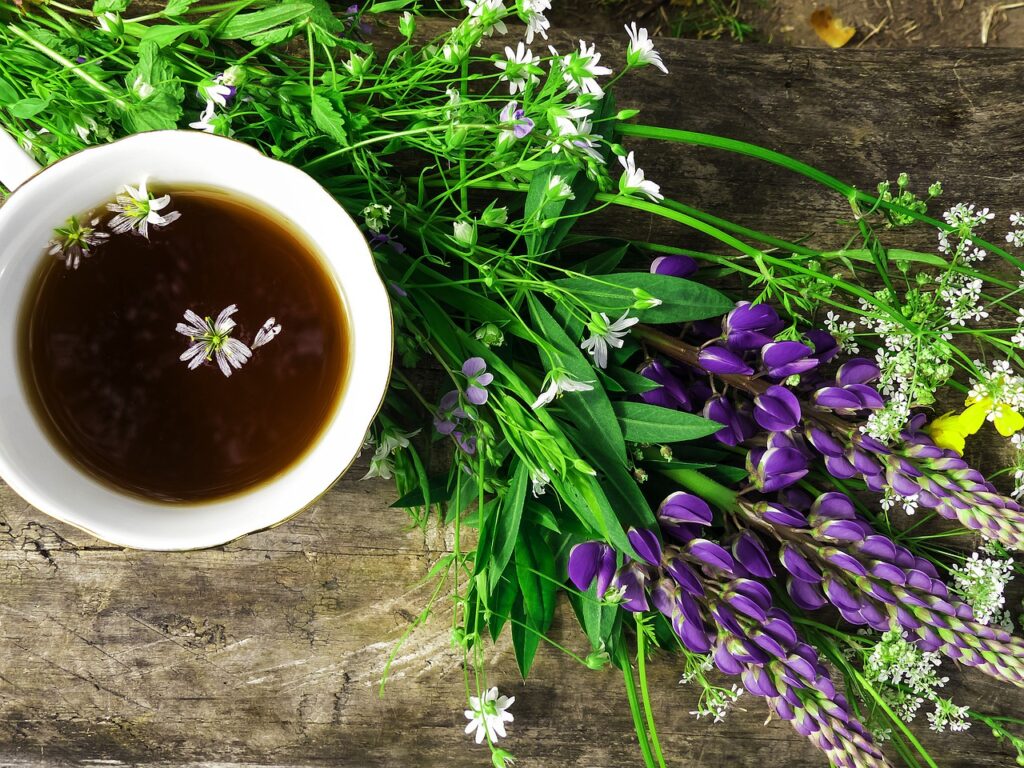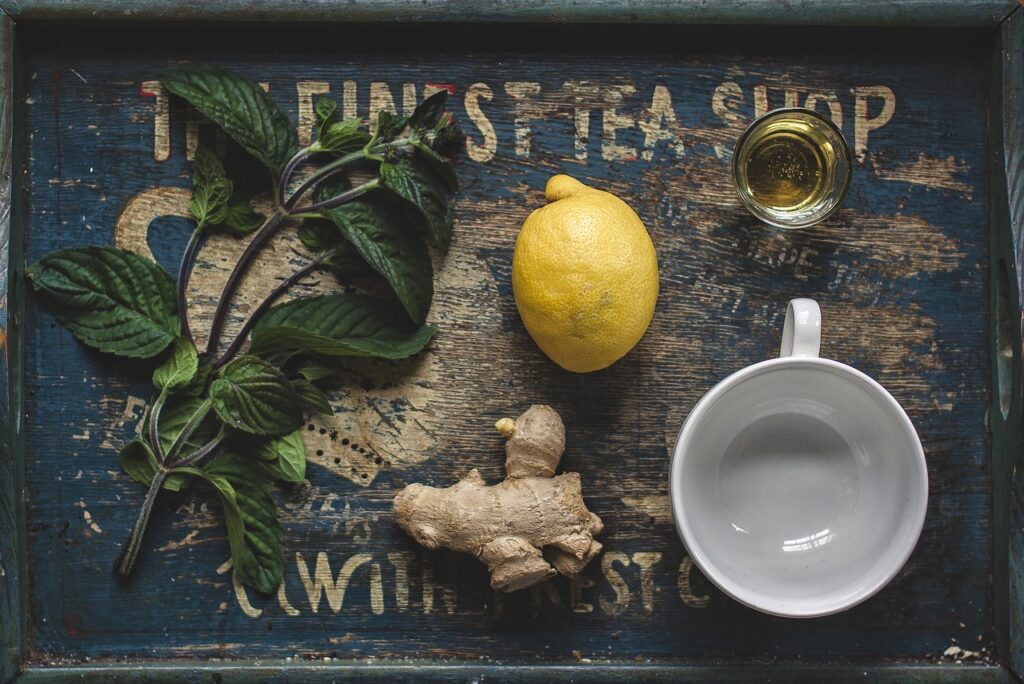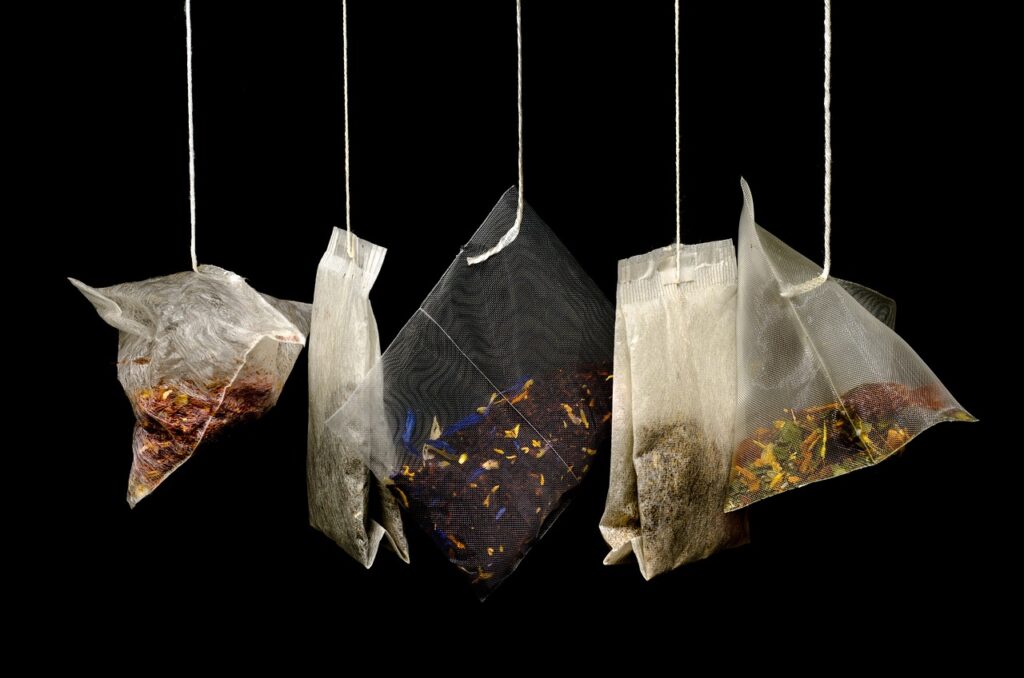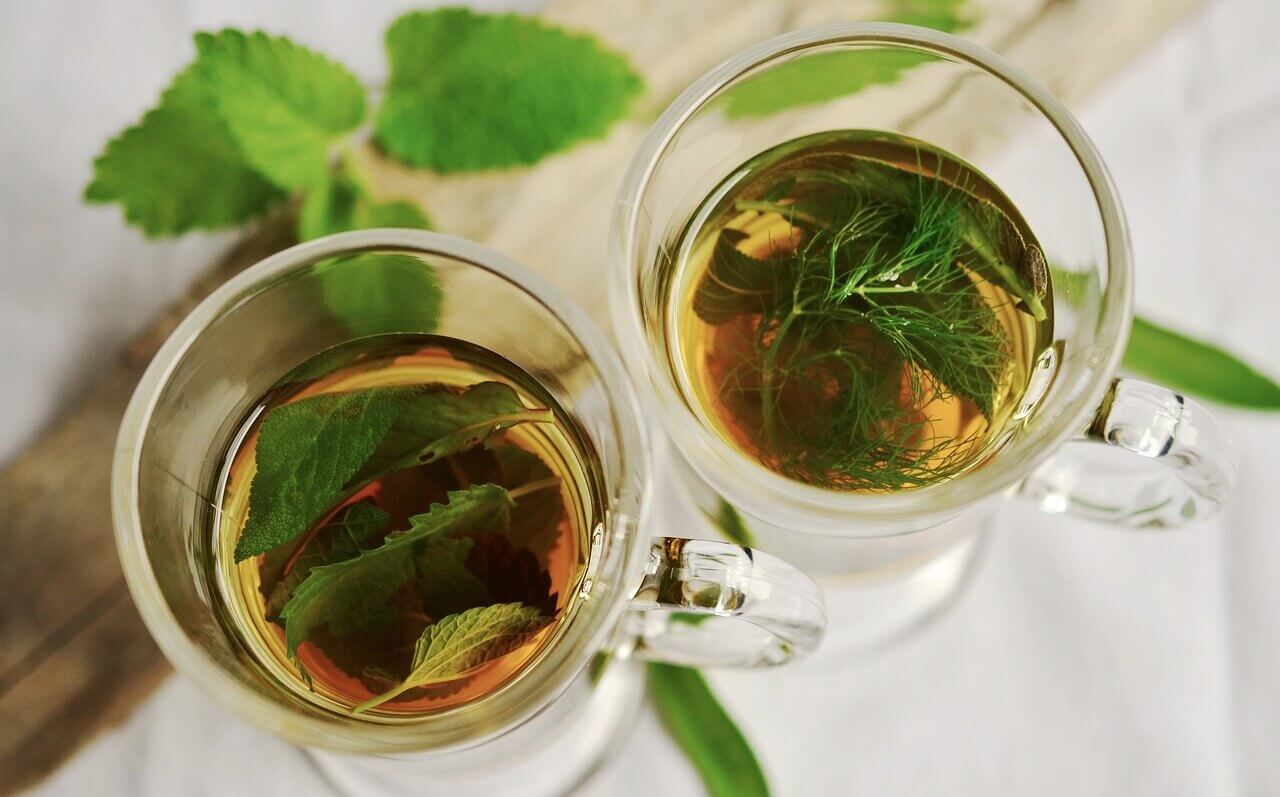Herbal Tea is a beverage made by steeping various parts of plants, such as leaves, flowers, seeds, or roots, in hot water. It has been enjoyed for centuries across different cultures for its soothing and aromatic qualities. Unlike traditional teas like black or green tea, herbal tea is typically caffeine-free, making it a popular choice for those looking to reduce their caffeine intake.
One of the key appeals of herbal tea is its diverse range of flavors and aromas. From calming chamomile to invigorating peppermint, there’s a herbal tea for every taste preference. Additionally, many herbal teas can be enjoyed hot or cold, providing versatility in serving options.

Beyond its sensory pleasures, herbal tea is also known for its potential health benefits. Depending on the herbs used, herbal tea may offer various medicinal properties:
- Digestive Health: Certain herbs like ginger, peppermint, and fennel have been traditionally used to aid digestion, reduce bloating, and alleviate stomach discomfort.
- Relaxation and Stress Relief: Chamomile, lavender, and lemon balm are popular herbs known for their calming effects. Drinking herbal tea infused with these herbs may promote relaxation and help reduce stress and anxiety.
- Immune Support: Herbs like echinacea, elderberry, and rose hips are rich in antioxidants and vitamins that support the immune system and may help ward off colds and flu.
- Sleep Aid: Herbal teas such as valerian root, passionflower, and chamomile are often used as natural remedies for insomnia and promoting restful sleep.
- Anti-inflammatory Properties: Turmeric, cinnamon, and ginger are herbs known for their anti-inflammatory properties, which may help reduce inflammation in the body and alleviate symptoms of conditions like arthritis.
- Hydration: Herbal tea is an excellent way to stay hydrated, especially for those who find plain water boring. Hydration is essential for overall health and well-being.
Contents
Pros of Herbal Tea: A Cup of Comfort and Wellness
Natural Wellness
Chamomile is a popular herb for its calming properties, which can help alleviate stress and anxiety, and relieve symptoms of indigestion. Peppermint, known for its refreshing aroma and taste, has a cooling effect on the digestive tract, aiding in nausea and digestion. Peppermint tea is often consumed after meals to ease digestive discomfort and bloating.
Echinacea, a traditional medicine herb, boosts the immune system and fights off infections, particularly the common cold. It contains active compounds like flavonoids and polysaccharides, stimulating immune cell activity and enhancing defense mechanisms. These herbs can be incorporated into daily routines through teas, supplements, or topical applications. However, they should not be a substitute for medical treatment, and individuals with chronic or severe health conditions should consult a healthcare professional before using herbal remedies.
Herbal Tea: Relaxation and De-Stress
Lavender tea is a popular choice for its soothing aroma and calming properties, which can promote relaxation and reduce stress levels. Its floral fragrance induces a sense of calmness, which can help in promoting restful sleep and alleviating insomnia symptoms. Lavender tea may also help alleviate headaches and migraines due to its relaxing effects on the nervous system.

Lemon balm tea, a mint member, is known for its lemony aroma and flavor, which can ease anxiety and uplift mood. It contains compounds like rosmarinic acid and flavonoids, which have calming and mood-enhancing effects. Drinking lemon balm tea can reduce nervousness, promote relaxation, and improve overall well-being. It may also aid in digestion and relieve gastrointestinal discomfort associated with stress.
Incorporating lavender and lemon balm tea into your daily routine can provide a natural and enjoyable way to relax and de-stress. However, it’s essential to listen to your body and adjust consumption as needed, as individual responses to herbal remedies may vary.
Herbal Teas :A World of Flavor
Unlike its bitter cousin, black tea, herbal tea offers a vibrant flavor spectrum. Hibiscus tea boasts a tart and tangy taste, perfect for a refreshing iced beverage. Ginger tea delivers a spicy kick, while rooibos tea offers a naturally sweet and nutty flavor profile.
Herbal Teas: A Diverse Flavor Spectrum
Hibiscus Tea
Hibiscus tea is characterized by its vibrant red color and tart, tangy flavor. Made from the dried calyces of the hibiscus flower, this tea offers a refreshing and slightly sour taste profile. It’s often enjoyed as an iced beverage, especially during hot summer months, due to its thirst-quenching properties. Hibiscus tea is also packed with antioxidants and vitamin C, making it not only delicious but also beneficial for overall health.
Ginger Tea
Ginger tea is known for its spicy and invigorating flavor profile. Made from fresh or dried ginger root steeped in hot water, this tea delivers a warming sensation with every sip. The natural heat of ginger makes it an excellent choice for cold winter days or for soothing sore throats and upset stomachs. Ginger tea is also prized for its anti-inflammatory properties and digestive benefits, making it a popular choice for both flavor and wellness.

RooibosTea
Rooibos tea, also known as red tea, hails from South Africa and offers a naturally sweet and nutty flavor profile. Made from the leaves of the Rooibos plant, this caffeine-free tea is often compared to black tea but with a milder taste and less bitterness. Rooibos tea is rich in antioxidants and minerals like calcium and manganese, making it a nourishing choice for overall health. It’s commonly enjoyed plain or with a splash of milk and honey for added sweetness.
oolong tea
Oolong tea, a traditional Chinese tea, is known for its weight management benefits, blood sugar regulation, improved insulin sensitivity, heart health, antioxidant support, and digestive health. Its unique composition and processing method can boost metabolism, regulate blood sugar levels, and improve insulin sensitivity. Oolong tea’s anti-inflammatory properties may also enhance insulin sensitivity, especially for those with diabetes or insulin resistance. Regular consumption of oolong tea can lower LDL cholesterol levels, reduce blood pressure, and improve blood vessel function, reducing the risk of heart disease and stroke. Its antioxidants, including catechins and theaflavins, help neutralize harmful free radicals, protecting cells from damage and reducing inflammation. Oolong tea’s caffeine content can also promote bowel regularity and reduce constipation.
Cons of Herbal Tea: Brewing with Caution
Herbal teas, often touted for their health benefits, have several drawbacks. They may lack robust scientific evidence, potentially triggering allergic reactions in those with allergies. They may also interact with certain medications, enhancing or inhibiting their effects.
Quality control issues can arise from sourcing, processing, and storage, potentially contaminating the teas. Choosing reputable brands and purchasing from trusted sources can help mitigate the risk of exposure to contaminated teas. Overconsumption of herbal teas can lead to adverse effects, such as digestive upset, headaches, and dizziness. It’s crucial to follow recommended dosage guidelines and listen to your body’s cues to avoid overconsumption. Therefore, it’s essential to consult a healthcare professional for personalized advice and guidance when incorporating herbal teas into your routine.
Limited Scientific Evidence
Limited scientific evidence surrounding herbal teas is due to historical use, complexity of herbal remedies, and regulatory challenges. Historical use suggests potential benefits, but lacks conclusive evidence. Herbal teas are often composed of multiple plant compounds, making it difficult to isolate and study their specific mechanisms.
The quality of research studies can vary, with some being small-scale, poorly designed, or funded by biased sources. Regulatory challenges, such as not being classified as pharmaceutical drugs, may also limit the availability of robust scientific evidence. Placebo effects, where the act of consuming the tea leads to perceived health improvements, can also influence the perceived benefits. Further research is needed to validate claims and understand the underlying mechanisms of action.

Potential Drug Interactions
Herbal teas may contain bioactive compounds that can interact with medications, either by enhancing or inhibiting their effects. These interactions can affect the efficacy of medications, potentially reducing their effectiveness or increasing the risk of adverse effects. Some herbs may also increase the risk of adverse effects or toxicity associated with medications.
The likelihood and severity of herb-drug interactions can vary depending on individual factors, such as genetics, underlying health conditions, and medication dosages. It is essential to consult with a healthcare professional before incorporating herbal teas into your routine, especially if you are taking multiple medications or have complex medical conditions. Consultation with a doctor or pharmacist is crucial to ensure the safe and effective use of herbal remedies alongside conventional treatments.
Quality Control
Quality control is crucial in herbal teas for their efficacy and safety. High-quality herbs grown, harvested, and processed using strict measures retain their beneficial compounds and therapeutic properties. Organic ingredients, such as organic farming practices and organic certification, minimize exposure to harmful chemicals and ensure purity.
Proper processing techniques, such as air-drying, steam-distillation, or low-temperature extraction, preserve the herbs’ integrity and maximize potency. Reputable brands prioritize quality and transparency, conducting rigorous testing and quality assurance procedures. Customer reviews and recommendations from trusted sources can also provide insights into the tea’s flavor, aroma, and effectiveness. By prioritizing quality control and choosing high-quality herbal teas, consumers can enjoy the therapeutic effects of herbal medicine with confidence.
Overconsumption
Overconsumption of herbal teas can lead to various risks, including potential side effects, digestive upset, allergic reactions, and interactions with medications. Some herbs contain bioactive compounds that can have potent physiological effects on the body, and excessive intake may overwhelm the body’s natural processes. Overconsumption may cause nausea, bloating, or diarrhea, especially for herbs with laxative or diuretic properties.
Individuals with allergies or sensitivities may experience allergic reactions when overconsuming herbal teas containing those ingredients. Additionally, overconsumption may increase the risk of interactions with medications, especially if taking multiple drugs concurrently. To minimize the risk of overconsumption, it is essential to follow manufacturer’s steeping times and dosage guidelines.
Conclusion:
Herbal teas offer a plethora of potential benefits, ranging from relaxation and hydration to immune support and digestion aid. However, it’s crucial to approach herbal tea consumption with mindfulness, considering both its advantages and potential drawbacks. By doing so, you can enjoy the soothing comfort and wellness benefits of herbal tea while minimizing any risks.
FAQs (Frequently Asked Questions):
- Is herbal tea safe for everyone to drink?
- While herbal tea is generally safe, individuals with certain health conditions or those taking medications should consult their doctor before consuming herbal teas regularly.
- Can herbal tea help with weight loss?
- While herbal teas may support weight loss when combined with a healthy diet and exercise, they are not a magic solution. It’s essential to approach weight loss with a holistic approach.
- How much herbal tea should I drink per day?
- The recommended amount of herbal tea can vary depending on the individual and the type of herbal tea consumed. It’s advisable to follow serving suggestions and consult with a healthcare professional if unsure.
- Are there any side effects of drinking herbal tea?
- While rare, some individuals may experience allergic reactions or side effects from certain herbs in herbal teas. It’s essential to monitor your body’s response and discontinue use if any adverse effects occur.
- Can herbal tea be consumed by pregnant or breastfeeding women?
- Pregnant or breastfeeding women should exercise caution when consuming herbal teas, as certain herbs may have adverse effects. Consultation with a healthcare provider is recommended before consumption.

